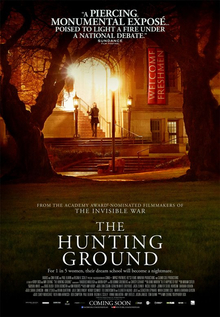Related Research Articles

Title IX is a landmark federal civil rights law in the United States that was enacted as part of the Education Amendments of 1972. It prohibits sex-based discrimination in any school or any other education program that receives funding from the federal government. This is Public Law No. 92‑318, 86 Stat. 235, codified at 20 U.S.C. §§ 1681–1688.

The Jeanne Clery Disclosure of Campus Security Policy and Campus Crime Statistics Act or Clery Act, signed in 1990, is a federal statute codified at , with implementing regulations in the U.S. Code of Federal Regulations at 34 CFR 668.46.
The Office for Civil Rights (OCR) is a sub-agency of the U.S. Department of Education that is primarily focused on enforcing civil rights laws prohibiting schools from engaging in discrimination on the basis of race, color, national origin, sex, disability, age, or membership in patriotic youth organizations.
Campus sexual assault is the sexual assault, including rape, of a student while attending an institution of higher learning, such as a college or university. The victims of such assaults are more likely to be female, but any gender can be victimized. Estimates of sexual assault, which vary based on definitions and methodology, generally find that somewhere between 19–27% of college women and 6–8% of college men are sexually assaulted during their time in college.

Amy Ziering is an American film producer and director. Mostly known for her work in documentary films, she is a regular collaborator of director Kirby Dick; they co-directed 2002's Derrida and 2020's On the Record, with Ziering also producing several of Dick's films.

Aisling Tucker Moore-Reed, known by her pen name Tucker Reed, is an American novelist and former civil rights activist who has been found liable for defamation and who was convicted of manslaughter in May 2020. Reed co-authored the young adult novel Amber House published in October 2012 and its sequel Neverwas, released internationally in January 2014.
Annie Elizabeth Clark is a women's rights and civil rights activist in the United States. She was one of the lead complainants of the 2013 Title IX and Clery Act charges lodged against the University of North Carolina at Chapel Hill, claiming that the institution violated the law by the way they handled sexual assault complaints. Clark and Andrea Pino, then a fellow UNC student and also a victim of sexual assault, launched a nationwide campaign to use Title IX complaints to force U.S. universities to address sexual assault and related problems more aggressively. Clark is co-founder with Pino of End Rape on Campus, an advocacy group for victims of campus sexual assault.
Angie Epifano, a former student at Amherst College, gained widespread media attention and millions of page views after she wrote an essay on her personal experience of sexual assault that was published in the Amherst student newspaper, The Amherst Student. After the publication of her essay, Amherst College began investigating its sexual assault procedures, and women from other college campuses in the United States came forward to file federal complaints under Title IX and to form groups to reduce sexual assault on college campuses.
Visible Music College is a private Christian music school in Memphis, Tennessee. It opened in 2000. Visible Music College is authorized for operation as a post-secondary educational institution by the Tennessee Higher Education Commission, offering three-year Bachelor's degrees, two-year Master's degrees, and a one-year certificate program. It is accredited by the Transnational Association of Christian Colleges and Schools (TRACS).
The Campus Accountability and Safety Act (CASA) was a bill introduced in the 114th United States Congress with the goal of reducing sexual violence on college and university campuses. First introduced in 2014, a revised bill was introduced in February 2015 by Senator Claire McCaskill of Missouri with nine bi-partisan cosponsors. 43 cosponsors eventually signed on. The bill died in committee at the end of the session without reaching a floor vote in either house.
In April 2013, Occidental College was one of the first in a series of US higher education institutions to be accused of failing to take campus sex crimes seriously by improperly reporting and adjudicating sexual assaults and covering up rapes. Occidental students and faculty filed two federal complaints against the College, alleging violations of Title IX of the US Education Amendments of 1972 and the Clery Act.

Mattress Performance (Carry That Weight) (2014–2015) was a work of endurance/performance art which Emma Sulkowicz conducted as a senior thesis during the final year of a visual arts degree at Columbia University in New York City.

The Hunting Ground is a 2015 American documentary film about the incidence of sexual assault on college campuses in the United States and the reported failure of college administrations to deal with it adequately. Written and directed by Kirby Dick and produced by Amy Ziering, it premiered at the 2015 Sundance Film Festival. The film was released on February 27, 2015, an edited version aired on CNN on November 22, 2015, and was released on DVD the week of December 1, 2015. It was released on Netflix in March 2016. Lady Gaga recorded an original song, "Til It Happens to You," for the film, which was nominated for the Academy Award for Best Original Song.
Know Your IX is an American political advocacy group founded in 2013. It aims to inform students of their right to an education free from gender-based violence under Title IX of the Education Amendments of 1972, which prohibits sex discrimination in institutions receiving federal government funding. The organization also seeks to influence legislation and policy to improve federal enforcement of Title IX and treatment of student victims.
Families Advocating for Campus Equality (FACE) is an American advocacy group whose stated goal is to ensure fairness and due process for all parties involved in allegations of sexual misconduct on college and university campuses. FACE was started by Sherry Warner Seefeld and two other mothers who say their sons were falsely accused of sexual misconduct on their college campuses.
In April 2013, Emma Sulkowicz, an American fourth-year visual arts major at Columbia University in New York City, filed a complaint with Columbia University requesting expulsion of fellow fourth-year student and German national, Paul Nungesser, alleging he had raped Sulkowicz in her dorm room on August 27, 2012. Nungesser was found not responsible by a university inquiry.

The Baylor University sexual assault scandal was the result of numerous allegations of and convictions for sexual and non-sexual assaults committed by Baylor University students, mostly players on the Baylor Bears football team. During a period from about 2012 to 2016, school officials suppressed reports of rapes and sexual misconduct. In 2016, Baylor's football team came under fire when it was revealed university officials had failed to take action regarding the alleged rapes and assaults. The scandal led to the ousting of head football coach Art Briles, the demotion and eventual resignation of Baylor president Ken Starr, the resignation of athletic director Ian McCaw, and the firing of two others connected with the football program. It also led to the resignation of Baylor's Title IX Coordinator, Patty Crawford. A plaintiff's attorney, Jim Dunnam, accused Baylor of implementing a ″concerted strategy to get the public to believe this is entirely and only a football-related problem."
After a sexual assault or rape, victims are often subjected to scrutiny and, in some cases, mistreatment. Victims undergo medical examinations and are interviewed by police. If there is a criminal trial, victims suffer a loss of privacy, and their credibility may be challenged. Victims may also become the target of slut-shaming, abuse, social stigmatization, sexual slurs and cyberbullying. These factors, contributing to a rape culture, are among some of the reasons that may contribute up to 80% of all rapes going unreported in the U.S, according to a 2016 study done by the U.S. Department of Justice.
Sofie Karasek is an American advocate for women's rights and the fight against sexual assault. In 2013, she helped launch a national movement to hold universities accountable for sweeping sexual harm under the rug under Title IX, and was a key driver behind California's "Yes Means Yes" law. She co-founded the advocacy organization called End Rape on Campus (EROC) in 2013.
Wendy Murphy is a lawyer specializing in child abuse and interpersonal violence.
References
- ↑ "ANDREA L. PINO-SILVA". ANDREA L. PINO-SILVA. Retrieved 2021-04-16.
- ↑ Vivian Kuo and Michael Pearson (March 8, 2013). "U.S. to investigate UNC's handling of sex assault reports". CNN.
- ↑ Andrea Pino (2013-01-19). "Why Filing an Office for Civil Rights Complaint Against UNC Is Bigger Than Me". Huffington Post. Retrieved 2013-06-21.
- 1 2 3 4 5 Johnson, Rebecca (October 9, 2014). "Campus Sexual Assault: Annie E. Clark and Andrea Pino Are Fighting Back—And Shaping the National Debate". Vogue. Archived from the original on October 11, 2014.
- ↑ Rosenberg, Alyssa (13 March 2015). "'The Hunting Ground' and the Challenge of Campus Rape". Washington Post.
- ↑ "We Believe You: Survivors of Campus Sexual Assault Speak Out". webelieveyou.net. Retrieved 2021-04-16.
- 1 2 3 Young, Cathy. "This UNC Rape Victim Became a Title IX Activist Leader. But Does Her Own Story Hold Up?" . Retrieved 2018-07-02.
- ↑ Piper, Greg (2018-07-03). "Co-founder of campus anti-rape group spun a 'web of lies,' says woman who knows her". The College Fix. Retrieved 2019-11-11.
- ↑ Brown, Julie K. (March 6, 2013). "College student from Miami fights for fair treatment of rape victims". The Miami Herald. Retrieved 2013-06-21.
- 1 2 3 Pino, Andrea. "Rape, Betrayal, and Reclaiming Title IX". The Huffington Post. Retrieved 2013-06-21.
- ↑ Pino, Andrea (2013-01-19). "Why Filing an Office for Civil Rights Complaint Against UNC Is Bigger Than Me". HuffPost. Retrieved 2021-04-16.
- ↑ Pérez-Peña, Richard (2013-03-08). "Students Initiate Inquiry Into Harassment Reports". The New York Times. ISSN 0362-4331 . Retrieved 2021-04-16.
- ↑ "Student activists spur sexual assault complaints, but some say Education Department is overstepping its bounds". www.insidehighered.com. 11 June 2013. Retrieved 2021-04-16.
- ↑ Stancill, Jane (June 1, 2013). "UNC-CH women wage national campaign against sexual assault". News and Observer. Retrieved 2013-06-21.
- ↑ Barnes, Brooks (2015-01-25). "An Unblinking Look at Sexual Assaults on Campus". The New York Times. ISSN 0362-4331 . Retrieved 2021-04-16.
- ↑ "Oscars: Joe Biden Introduces Lady Gaga for Performance of "Til It Happens to You"". The Hollywood Reporter. 2016-02-28. Retrieved 2021-04-16.
- ↑ Hirshman, Linda (2019). Reckoning: The Epic Battle Against Sexual Abuse and Harassment. Houghton Mifflin Harcourt. ISBN 978-1-328-56644-7.
- ↑ "Speaking of Feminism | Rachel F. Seidman". University of North Carolina Press. Retrieved 2021-04-16.
- ↑ Pérez-Peña, Richard (2013-03-19). "College Groups Connect to Fight Sexual Assault". The New York Times. ISSN 0362-4331 . Retrieved 2021-04-16.
- ↑ Clark, Annie E.; Pino, rea L. (2016-04-07). "What No One Understands About Campus Rape". Cosmopolitan. Retrieved 2021-04-16.
- ↑ "White House task force asks colleges for more accountability on sexual assault". PBS NewsHour. 2014-04-29. Retrieved 2021-04-16.
- ↑ Real Time with Bill Maher: The Hunting Ground (HBO), 17 March 2015, retrieved 2021-04-16
- ↑ "Meet the women taking on their universities over sexual assault". america.aljazeera.com. Retrieved 2021-04-16.
- ↑ "Preventing sexual assault on college campuses". MSNBC.com. Retrieved 2021-04-16.
- ↑ "Andrea Pino | HuffPost". www.huffpost.com. Retrieved 2021-04-16.
- ↑ "The 2013 Influence List". www.chronicle.com. 9 December 2013. Retrieved 2021-04-16.
- ↑ "Meet The People Who Made The Biggest Impact In Higher Ed This Year". HuffPost. 2013-12-30. Retrieved 2021-04-16.
- ↑ "PLANNED PARENTHOOD HONORS DR. WILLIE PARKER, JENNY SLATE, STAR OF OBVIOUS CHILD, AND THE CW'S JANE THE VIRGIN AT ANNUAL GALA". www.plannedparenthood.org. Retrieved 2021-04-16.
- ↑ "Campus sexual assault inspires rare bipartisan bill". MSNBC.com. 30 July 2014. Retrieved 2021-04-16.
- ↑ "Kirsten Gillibrand | U.S. Senator for New York". www.gillibrand.senate.gov. Retrieved 2021-04-16.
- ↑ "UNC found to have violated Title IX in multiyear investigation". www.insidehighered.com. 27 June 2018. Retrieved 2021-04-16.
- ↑ Stancill, Jane. "UNC found in violation of federal law in its handling of sex assault and discrimination".
- ↑ "UNC enters into $1.5 million settlement over Clery Act violations, chancellor announces". The Daily Tar Heel. Retrieved 2021-04-16.
- ↑ Murphy, Kate. "UNC-Chapel Hill violated federal campus safety law for years. Students made them fix it".
- ↑ Murphy, Kate. "A third of female undergraduate UNC students reported sexual assault, survey found".
- ↑ "Home". www.theoutwordsarchive.org. Retrieved 2021-04-16.
- ↑ "Ahead of the Curve". Ahead of the Curve. Retrieved 2021-04-16.
- ↑ "Beyond Film: 0.5% and Trending Down - Lgbtq+ Womxn's Representation In Film at Roxie Theater". DoTheBay. Retrieved 2021-04-16.
- ↑ "End Rape on Campus".
- ↑ "National Center for Lesbian Rights". National Center for Lesbian Rights. Retrieved 2021-04-16.
- ↑ "CJAF". CJAF. Retrieved 2021-04-16.
- ↑ "The Conversation: 'Hunting Ground' heroes". ESPN.com. 2015-04-28. Retrieved 2021-04-16.
- ↑ Emanuella Grinberg (2014-02-09). "Ending rape on campus: Activism takes several forms". CNN. Retrieved 2021-04-16.